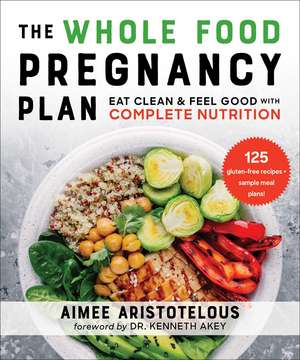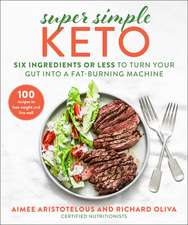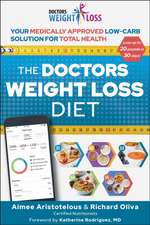The Whole Food Pregnancy Plan: Eat Clean & Feel Good with Complete Nutrition
Autor Aimee Aristotelous Cuvânt înainte de Dr. Kenneth Akey MDen Limba Engleză Paperback – 7 iul 2022
More and more studies show that the human body is not meant to digest the amount of processed wheat we've grown accustomed to. Whether you have Celiac disease or are simply trying to reduce your gluten intake, you are guaranteed to benefit from this insightful book. We all know that "you are what you eat." And once you conceive, your baby is what you eat as well—prenatal health and nutrition during pregnancy is so imperative!
The US is one of only eight countries in the world where the rate of mortality for pregnant women is on the rise, and obesity is one of the primary causes of this phenomenon—half of all pregnant women are considered overweight (not due to baby weight gained during pregnancy, which is completely natural and expected).
Widely accepted, doctor- and dietitian-prescribed nutrition guidelines actually may be contributing to the growing obesity and gestational diabetes epidemics. Newly expectant mothers receive a packet of health information from their doctors, including a nutrition pamphlet, which proscribes a daily food regimen with 100 grams of sugar per day—the amount of sugar in 10 glazed donuts!
Aimee has developed a comprehensive nutrition guide that helps expecting and postpartum women achieve ideal health and weight during pregnancy and beyond. Implementing philosophies of current, highly-effective gluten-free nutrition trends that have not been fully introduced to the prenatal and postpartum populations, The Whole Pregnancy offers a detailed dietary regimen that is based on whole and unprocessed foods, low-glycemic carbohydrates, quality proteins, and essential fats. Developed by a certified nutritionist, the meal-planning system presents a variety of simple, delicious recipes to benefit mother and baby. It also provides special instruction for each stage of pregnancy, including the first, second, and third trimesters, as well as the “fourth trimester” of postpartum weight loss and nursing.
Preț: 86.89 lei
Preț vechi: 131.88 lei
-34% Nou
Puncte Express: 130
Preț estimativ în valută:
16.63€ • 17.36$ • 13.76£
16.63€ • 17.36$ • 13.76£
Carte disponibilă
Livrare economică 14-26 martie
Livrare express 27 februarie-05 martie pentru 90.46 lei
Preluare comenzi: 021 569.72.76
Specificații
ISBN-13: 9781510768673
ISBN-10: 151076867X
Pagini: 320
Ilustrații: Color photographs
Dimensiuni: 191 x 229 x 18 mm
Greutate: 0.86 kg
Editura: Skyhorse
Colecția Skyhorse
ISBN-10: 151076867X
Pagini: 320
Ilustrații: Color photographs
Dimensiuni: 191 x 229 x 18 mm
Greutate: 0.86 kg
Editura: Skyhorse
Colecția Skyhorse
Notă biografică
Aimee Aristotelous is a certified nutritionist, specializing in prenatal dietetics as well as ketogenic and gluten-free nutrition. Her expertise has been featured in a variety of publications including Health, People, Huffington Post, Yahoo! News, Insider, Motherly, Consumer Health Digest, Simply Gluten-Free, Well + Good, The National Celiac Association, and Delight Gluten-Free. As a new mother, Aimee was able to use her own pregnancy as a platform to apply her educational background and research, which resulted in an optimally healthy, active, and ideal pregnancy. During her pregnancy, she was hired by the company “Belly Bandit” to model a line of their pregnancy lingerie. In addition to her Nutrition and Wellness certification through American Fitness Professionals and Associates, Aimee has a bachelor’s degree in business/marketing from California State University, Long Beach. She is also the author of Almost Keto, The 30-Day Keto Plan, and Super Simple Keto. Aimee enjoys the beach, cooking, and traveling, and resides with her husband and son in Fort Lauderdale, Florida.
Dr. Kenneth Akey is a board-certified Mission Viejo pediatrics doctor who serves the Mission Viejo and Saddleback areas of Orange County, California. In his twenty-five years of private practice, Dr. Akey has cultivated many strong relationships with his patients and their families. A graduate of the University of California, Irvine, School of Medicine, Dr. Akey’s passions include developmental pediatrics and nutrition. He stresses the importance of a healthy diet to all of his patients and their parents, as they are often the ones with ultimate control over what their child eats. When Dr. Akey isn’t providing warm, knowledgeable care for children, he enjoys working out, being involved at his church, and spending time with his wife, children, and grandchildren.
Dr. Kenneth Akey is a board-certified Mission Viejo pediatrics doctor who serves the Mission Viejo and Saddleback areas of Orange County, California. In his twenty-five years of private practice, Dr. Akey has cultivated many strong relationships with his patients and their families. A graduate of the University of California, Irvine, School of Medicine, Dr. Akey’s passions include developmental pediatrics and nutrition. He stresses the importance of a healthy diet to all of his patients and their parents, as they are often the ones with ultimate control over what their child eats. When Dr. Akey isn’t providing warm, knowledgeable care for children, he enjoys working out, being involved at his church, and spending time with his wife, children, and grandchildren.
Extras
On December 11, 2014, I got the big news at my doctor’s office—I was expecting! I was given a large goody bag filled with everything
from prenatal vitamin samples to umbilical cord blood banking service pamphlets. As a certified nutritionist, I naturally gravitated toward the packet of nutrition information, which covered topics such as proper weight gain during pregnancy, how to avoid gestational diabetes, and foods one should eat to benefit mother and baby. The pamphlet, a generic one which most likely circulates through thousands of doctors’ offices, listed the following as a daily guide for “good nutrition during pregnancy.”
Daily Recommended Foods and Servings
2 slices of bread
1 cup of cereal
1½ cups of pasta
2½ cups of vegetables
2 cups of fruit or fruit juice
5 ounces of meat, poultry, fish, beans, eggs, or nuts
3 cups of milk
One may look at these recommendations and nod at the fact that they seem “normal” for today’s standards and yes, they are normal; however, they are extremely faulty and actually contribute to serious medical conditions that run rampant in today’s population of pregnant women, such as gestational diabetes and excessive weight gain. Let’s take this recommended daily intake of food and break it down into macro-nutrients (carbohydrates, protein, fat) as well as sugar so we can get a better understanding of the implications of these suggested foods.
As you can see, this suggested example of one day of “healthy food” results in 100 grams of sugar, as well as an abundance of carbohydrates from processed gluten-foods. To put it into perspective, this is equivalent to eating ten glazed donuts in one day! One may say that sugars from the above listed foods are different than refined sugar—unfortunately, your body is negatively affected by too much sugar, whether it comes from a refined or natural source. Another possible argument is that these foods do offer a variety of nutritional
benefits (unlike ten glazed donuts), thus justifying the sugar and carbohydrate intake. I will explain in later chapters how to get twice the nutrients that this typical plan offers, while consuming less than half the sugar, and no high-glycemic, gluten-containing carbohydrates (your carbs will come from different sources)!
Why is it so important that we reduce sugar and high-glycemic carbohydrate intake? According to the Center for Disease Control, gestational diabetes affects up to ten percent of all pregnant women. Gestational diabetes occurs around the twenty-fourth week of pregnancy and is a result of the placenta releasing hormones that make it difficult for the mother’s body to create and use insulin. Insulin is needed to balance blood sugar levels; if you don’t make and use enough insulin, then sugar or glucose builds up in your blood. Not only is this dangerous to the mother, it can also negatively affect the baby as the excess glucose crosses the placenta, resulting in high sugar levels for the baby. The baby’s pancreas will work overtime to combat the extra glucose which crosses the placenta by releasing insulin. Babies born to mothers with gestational diabetes are at higher risk of growing into children and adults who develop type II diabetes and obesity.
Conditions such as gestational diabetes put the mother at risk as well. According to the World Health Organization, around twenty-eight
women die in the United States for every 100,000 births. This number has more than doubled since 1990, resulting in the United States being the only developed country that has a maternal mortality rate that is on the rise. This is due to a plethora of issues that face pregnant women, including increased rates of obesity, cardiovascular disease, and diabetes. What do all of these conditions have in common? It is possible to combat and regulate them through diet alone. Unfortunately, the outdated nutrition recommendations made by the literature provided in the offices of many OB-GYNs may actually cause these conditions—not prevent them!
In addition to nutrition recommendations given in pamphlets that I received from my doctor, I began to explore the information in popular
pregnancy nutrition books as well. I came across a best-selling pregnancy nutrition book that boasts examples of daily menus including the sample shown on the next page. Once again, I’ll break this sample menu down so we can understand how many grams of sugar one will consume when following this advice.
Going back to the comparison of sugar in glazed donuts, this day of “healthy food” equates to thirteen donuts! After realizing that these types of recommendations are the primary sources of information for pregnant women, I decided to research titles written by widely popular medical organizations to see if their advice aligned with these faulty guidelines. To no surprise, they, too recommend high-sugar,
high-carbohydrate, gluten-filled diets which are disguised as “healthy foods.” One widely relied-upon organization in particular even stated that pregnant women should “stay away from fat such as avocado,” despite the fact that avocado is a pregnancy superfood as the growing fetus thrives on healthy fats for brain development (I’ll get into that in later chapters)!
I decided to write The Whole Pregnancy because the current nutrition recommendations for pregnant women are still based on old frameworks such as the food pyramid from the 1970s. After seeing the advice that is offered in several literary sources and in doctors’ offices, it’s no wonder that millions of pregnant women are suffering from diet-related conditions despite the fact that they are, most likely, following the advice given to them by their doctors and nutritionists. I applied my own research to create my own case study
during my pregnancy and I will share in the following chapters the gluten-free nutrition regimen that resulted in a twenty-five-pound weight gain and nine-pound, twelve-ounce healthy baby boy. Despite the fact that I was a woman of “advanced maternal age” which implies that I would be more susceptible to conditions like gestational diabetes, hypertension, and preeclampsia, my blood sugar levels and blood pressure remained in perfect ranges. I had a completely natural, drug-free child birth and returned to my pre-pregnancy
weight before my six-week postpartum check-up—and you can do the same!
from prenatal vitamin samples to umbilical cord blood banking service pamphlets. As a certified nutritionist, I naturally gravitated toward the packet of nutrition information, which covered topics such as proper weight gain during pregnancy, how to avoid gestational diabetes, and foods one should eat to benefit mother and baby. The pamphlet, a generic one which most likely circulates through thousands of doctors’ offices, listed the following as a daily guide for “good nutrition during pregnancy.”
Daily Recommended Foods and Servings
2 slices of bread
1 cup of cereal
1½ cups of pasta
2½ cups of vegetables
2 cups of fruit or fruit juice
5 ounces of meat, poultry, fish, beans, eggs, or nuts
3 cups of milk
One may look at these recommendations and nod at the fact that they seem “normal” for today’s standards and yes, they are normal; however, they are extremely faulty and actually contribute to serious medical conditions that run rampant in today’s population of pregnant women, such as gestational diabetes and excessive weight gain. Let’s take this recommended daily intake of food and break it down into macro-nutrients (carbohydrates, protein, fat) as well as sugar so we can get a better understanding of the implications of these suggested foods.
As you can see, this suggested example of one day of “healthy food” results in 100 grams of sugar, as well as an abundance of carbohydrates from processed gluten-foods. To put it into perspective, this is equivalent to eating ten glazed donuts in one day! One may say that sugars from the above listed foods are different than refined sugar—unfortunately, your body is negatively affected by too much sugar, whether it comes from a refined or natural source. Another possible argument is that these foods do offer a variety of nutritional
benefits (unlike ten glazed donuts), thus justifying the sugar and carbohydrate intake. I will explain in later chapters how to get twice the nutrients that this typical plan offers, while consuming less than half the sugar, and no high-glycemic, gluten-containing carbohydrates (your carbs will come from different sources)!
Why is it so important that we reduce sugar and high-glycemic carbohydrate intake? According to the Center for Disease Control, gestational diabetes affects up to ten percent of all pregnant women. Gestational diabetes occurs around the twenty-fourth week of pregnancy and is a result of the placenta releasing hormones that make it difficult for the mother’s body to create and use insulin. Insulin is needed to balance blood sugar levels; if you don’t make and use enough insulin, then sugar or glucose builds up in your blood. Not only is this dangerous to the mother, it can also negatively affect the baby as the excess glucose crosses the placenta, resulting in high sugar levels for the baby. The baby’s pancreas will work overtime to combat the extra glucose which crosses the placenta by releasing insulin. Babies born to mothers with gestational diabetes are at higher risk of growing into children and adults who develop type II diabetes and obesity.
Conditions such as gestational diabetes put the mother at risk as well. According to the World Health Organization, around twenty-eight
women die in the United States for every 100,000 births. This number has more than doubled since 1990, resulting in the United States being the only developed country that has a maternal mortality rate that is on the rise. This is due to a plethora of issues that face pregnant women, including increased rates of obesity, cardiovascular disease, and diabetes. What do all of these conditions have in common? It is possible to combat and regulate them through diet alone. Unfortunately, the outdated nutrition recommendations made by the literature provided in the offices of many OB-GYNs may actually cause these conditions—not prevent them!
In addition to nutrition recommendations given in pamphlets that I received from my doctor, I began to explore the information in popular
pregnancy nutrition books as well. I came across a best-selling pregnancy nutrition book that boasts examples of daily menus including the sample shown on the next page. Once again, I’ll break this sample menu down so we can understand how many grams of sugar one will consume when following this advice.
Going back to the comparison of sugar in glazed donuts, this day of “healthy food” equates to thirteen donuts! After realizing that these types of recommendations are the primary sources of information for pregnant women, I decided to research titles written by widely popular medical organizations to see if their advice aligned with these faulty guidelines. To no surprise, they, too recommend high-sugar,
high-carbohydrate, gluten-filled diets which are disguised as “healthy foods.” One widely relied-upon organization in particular even stated that pregnant women should “stay away from fat such as avocado,” despite the fact that avocado is a pregnancy superfood as the growing fetus thrives on healthy fats for brain development (I’ll get into that in later chapters)!
I decided to write The Whole Pregnancy because the current nutrition recommendations for pregnant women are still based on old frameworks such as the food pyramid from the 1970s. After seeing the advice that is offered in several literary sources and in doctors’ offices, it’s no wonder that millions of pregnant women are suffering from diet-related conditions despite the fact that they are, most likely, following the advice given to them by their doctors and nutritionists. I applied my own research to create my own case study
during my pregnancy and I will share in the following chapters the gluten-free nutrition regimen that resulted in a twenty-five-pound weight gain and nine-pound, twelve-ounce healthy baby boy. Despite the fact that I was a woman of “advanced maternal age” which implies that I would be more susceptible to conditions like gestational diabetes, hypertension, and preeclampsia, my blood sugar levels and blood pressure remained in perfect ranges. I had a completely natural, drug-free child birth and returned to my pre-pregnancy
weight before my six-week postpartum check-up—and you can do the same!
Recenzii
“A wealth of research and knowledge of nutrition is presented here, in a clear and informative guide focusing on natural unprocessed foods, complete with mouthwatering recipes and meal plans that are easy to follow. What a fantastic resource for women striving to equip themselves with invaluable knowledge of how to best nourish their bodies to the optimal level for both themselves and their babies—not just prenatally, but also through pregnancy and the postpartum period.”
—Lisa Edlund, CNS, RNDIV1, RM
"Aimee combines healthful recipes with a user friendly, comprehensive guide to eating better for both you and your baby; I wish this book existed when I was first working with clients on fertility, pregnancy, and breastfeeding!"
—Ariane Resnick, CNC, chef and author of The Bone Broth Miracle
"The Whole Pregnancy answers common questions and concerns with an updated and more mindful approach! Aimee's book speaks to those who realize that food should be one's medicine, as it plays the most important role in prenatal development."
—Alexandra Maw, founder of Kaleidoscope Juice
“This is a comprehensive guide to being as healthy as possible during pregnancy while optimizing the nutrition needed by a growing brain. Time and again, we see the removal of gluten from one's diet enhance the wellbeing of parents and children alike—I couldn’t recommend following Aimee’s guide any more strongly. It’s the only one you need during your pregnancy.”
—J.B. Handley, cofounder of Generation Rescue
“Aimee has always been so inquisitive and determined, with complete focus, passion for wellness, and overall trust in her body. Her persistence and knowledge shines through in her everyday life and through this incredible book. I'm eager to share this resource with all of my pregnant & postpartum clients!”
—Lauren Jacobs, doula and owner of Doulas of Orange County
"Aimee does a great job of taking a complex subject and making it easy—and fun—to read, comprehend, and most importantly, follow. The recipes look so delicious that the whole family will enjoy them, not just the one who is pregnant!"
—Kendra Whitmire, MS, nutritionist at Sunshine Nutrition & Wellness
“All I can say is FINALLY a book about having a successful and nutritious, gluten-free pregnancy! I was soaking up every word while feeling empowered and educated about the whole process. Aimee put me at ease with her no-stress meal plans and knowledge about what is best for the baby. I know I will be using this as my pregnancy guide and I highly encourage people to pick up a copy of this book even before they are pregnant, as these principals can be easily applied to everyday eating!”
—Emily Turner, gluten-free private and personal chef; creator of Gluten Free With Emily
"Aimee’s attention to detail when it comes to nutrition education is spot on, and her recipes are delicious—whether you are following a gluten-free diet or not. This book helps you to understand what foods and supplements you and your baby need to ensure a healthy pregnancy. Pregnancy should be a joyful time in our life, but worrying about what to eat could be tiresome! Aimee takes the guesswork away and allows you to do what you do best: grow new life. Anyone expecting should add The Whole Pregnancy to their pregnancy book collection."
—Andrea Donsky, holistic nutritionist, author of Unjunk Your Junk Food
“The Whole Pregnancy is an essential primer for women before, during, and after pregnancy. The easy-to-follow format offers practical advice, helpful charts, and doable recipes for eating foods that are nutrient-dense to support both mom and baby. It is the perfect gift for an expecting mother!”
—Cynthia Spivey, author of How to Eat Paleo (When You Don't Live in a Cave)
—Lisa Edlund, CNS, RNDIV1, RM
"Aimee combines healthful recipes with a user friendly, comprehensive guide to eating better for both you and your baby; I wish this book existed when I was first working with clients on fertility, pregnancy, and breastfeeding!"
—Ariane Resnick, CNC, chef and author of The Bone Broth Miracle
"The Whole Pregnancy answers common questions and concerns with an updated and more mindful approach! Aimee's book speaks to those who realize that food should be one's medicine, as it plays the most important role in prenatal development."
—Alexandra Maw, founder of Kaleidoscope Juice
“This is a comprehensive guide to being as healthy as possible during pregnancy while optimizing the nutrition needed by a growing brain. Time and again, we see the removal of gluten from one's diet enhance the wellbeing of parents and children alike—I couldn’t recommend following Aimee’s guide any more strongly. It’s the only one you need during your pregnancy.”
—J.B. Handley, cofounder of Generation Rescue
“Aimee has always been so inquisitive and determined, with complete focus, passion for wellness, and overall trust in her body. Her persistence and knowledge shines through in her everyday life and through this incredible book. I'm eager to share this resource with all of my pregnant & postpartum clients!”
—Lauren Jacobs, doula and owner of Doulas of Orange County
"Aimee does a great job of taking a complex subject and making it easy—and fun—to read, comprehend, and most importantly, follow. The recipes look so delicious that the whole family will enjoy them, not just the one who is pregnant!"
—Kendra Whitmire, MS, nutritionist at Sunshine Nutrition & Wellness
“All I can say is FINALLY a book about having a successful and nutritious, gluten-free pregnancy! I was soaking up every word while feeling empowered and educated about the whole process. Aimee put me at ease with her no-stress meal plans and knowledge about what is best for the baby. I know I will be using this as my pregnancy guide and I highly encourage people to pick up a copy of this book even before they are pregnant, as these principals can be easily applied to everyday eating!”
—Emily Turner, gluten-free private and personal chef; creator of Gluten Free With Emily
"Aimee’s attention to detail when it comes to nutrition education is spot on, and her recipes are delicious—whether you are following a gluten-free diet or not. This book helps you to understand what foods and supplements you and your baby need to ensure a healthy pregnancy. Pregnancy should be a joyful time in our life, but worrying about what to eat could be tiresome! Aimee takes the guesswork away and allows you to do what you do best: grow new life. Anyone expecting should add The Whole Pregnancy to their pregnancy book collection."
—Andrea Donsky, holistic nutritionist, author of Unjunk Your Junk Food
“The Whole Pregnancy is an essential primer for women before, during, and after pregnancy. The easy-to-follow format offers practical advice, helpful charts, and doable recipes for eating foods that are nutrient-dense to support both mom and baby. It is the perfect gift for an expecting mother!”
—Cynthia Spivey, author of How to Eat Paleo (When You Don't Live in a Cave)





















